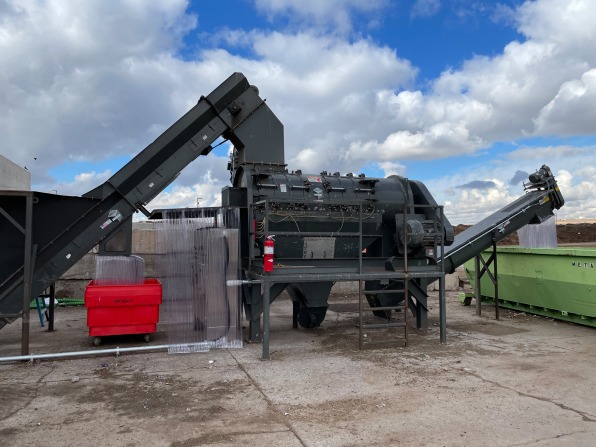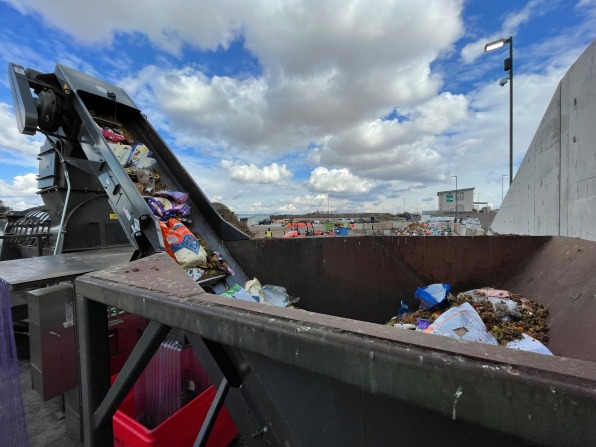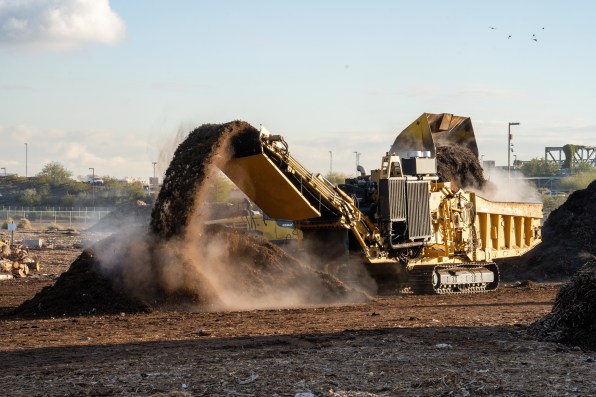Arizona’s capital expects fans to generate tons of food and packaging waste—and that’s not even at the game itself.
More than a million fans will descend on Phoenix this weekend for Super Bowl LVII and all of its accompanying events. While they get ready to cheer on the Eagles or the Chiefs, they’ll contribute to an estimated 2,000 tons of food and waste packaging from all the concerts, food festivals, and contests they attend around the city.
There will be plenty of sources of that waste. The Phoenix Convention Center is holding the Super Bowl Experience, a five-day party expected to attract 180,000 visitors. Described by the NFL as an “interactive theme park,” it will give guests a sneak peek of the Vince Lombardi Trophy and let them compete in games like the 40-yard dash and a combine obstacle course. Food concessions will be served throughout.

Rihanna is headlining the Super Bowl halftime show, but the city is hosting a music festival earlier in the weekend with performances by Paramore and Imagine Dragons. Meanwhile, the Taste of the NFL food event will feature celebrity chefs such as Andrew Zimmern and Carla Hall serving up dishes like root-beer-glazed wings, crab and artichoke dip, and sweet-and-sour meatballs.
Denali has worked with Phoenix for six years, separating the city’s food waste from packaging trash and turning the organic material into compost. The infrastructure is already in place, with a composting facility in the city that was equipped this year with a 30-foot-long turbo waste separator (or “depackaging” tool).

The “depackager” will be fed all the leftover wings, ranch sauce, fries, and beer—and their packaging. It will all be dumped into a “hopper,” a large receptacle that tapers downward, before it passes through a “trommel screen,” which is a machine with a series of larger and smaller holes, explains Oscar Rodriguez, general manager of Denali’s Arizona facilities. Paddles press against the waste to compress the food, and it’s “mashed through” the screen; bones are also shredded by the machine’s grinders and join the food heap.
Packaging materials enter another compartment, are separated, and then sent to one of the city’s facilities for processing. Rodriguez estimates that as much as 97% of the trash will be separated successfully.
Once cleaned, the food waste is added to other green waste, like grass and leaves, eventually forming compost. “Before we had this technology, there wasn’t a whole lot we could do with it,” Liebl says. “But now we’re able to come up with a clean stream of organic material.”

After 40 to 60 days, Denali markets the compost in bulk, mostly in the Southwest. Companies that buy the material use it in landscaping or blend it into soils that are sold to consumers. In 2022, Phoenix sold nearly 25,000 cubic yards of compost. Liebl claims that’s enough to cover 11 football fields with a 1-foot layer.
Compost holds a lot of moisture, which is helpful in markets like Arizona, where the soil is dry. The compost assists with water retention, keeping plants healthy and filled with nutrients, which, Liebl explains, reduces reliance on fertilizers, sprinklers, and rainfall in an arid state.
The depackager is a relatively new tool for Denali. It currently has six operating in four states, but this will be its largest-scale use so far, and will be a test of whether municipalities can handle waste of that magnitude. If successful, “there’s no reason that this could not be applied at a stadium year-round for things like concerts [or] an entire season of football games,” Liebl says.
Notably, the game itself will be played at the State Farm Stadium in Glendale, a Phoenix suburb with a separate waste infrastructure. NFL Green’s director, Jack Groh, explains that Glendale doesn’t have commercial composting, so if fans mix in their various trash items with food scraps instead of separating them, local recycling companies will consider the waste streams contaminated and likely send them to landfills.
To mitigate that, crews will scour the entire stadium for trash after the game, and hand-separate recyclables from nonrecyclables. Food scraps will be donated to a local farm for animal feed. “It’s a simple, low-tech strategy, but it works extremely well for producing a clean stream of recyclables,” Groh says.
